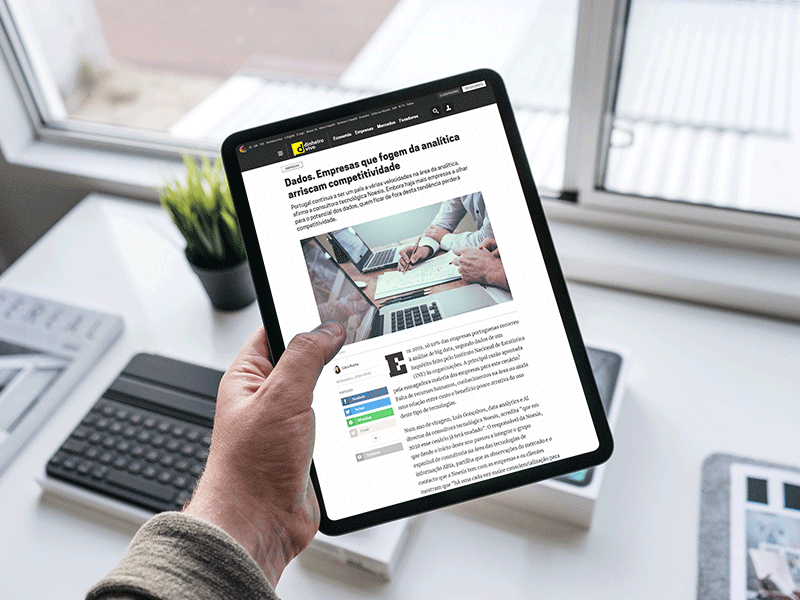

By Luís Gonçalves, Data Analytics & AI Director at Noesis
In 2019, only 10% of Portuguese companies resorted to big data analysis, according to data from a survey conducted by the National Statistics Institute (INE) to organizations. The main reason cited by the overwhelming majority of companies for this scenario? Lack of human resources, knowledge in the area or an unattractive relationship between cost and benefit of using this type of technologies.
In a turning year, Luís Gonçalves, data analytics and AI director of the technological consultancy Noesis, believes "that in 2020 this scenario will have already changed". The head of Noesis, who since the beginning of this year has joined the Spanish consultancy group in the area of information technology Altia, shares that the market observations and the contact that Noesis has with companies and customers show that "there is an increasing awareness of the need to capture all the information that the organization generates and to have the ability to analyze it".
"Nowadays organizations need to maximize interactions and business with their customers and to be competitive in order to win new customers, which makes information a very important asset for them to be able to analyze, for example, what results and what doesn't result in your strategies. "
Luís Gonçalves emphasizes that the pandemic context has further accelerated the need to create new offers for customers, something that reinforced, once again, the importance of data. "Also the reduction of technological barriers to entry, the democratization of cloud solutions, which are increasingly cheaper and easy to configure, are factors that contribute to invert" the scenario portrayed by INE, he points out.
"The ability to create or migrate existing solutions to cloud environments, where the configuration, scalability and automation of processes is much simpler, also allows to reduce the need for differentiated and specialized human resources, as well as the need for large initial investments, that were a big obstacle to adopting a data analysis solution. "
Portugal continues to be a country at various speeds in data analysis, an uneven market. Even so, the most advanced companies in Portugal on the subject "are references comparable to the best that is done in other countries and markets", highlights the head of Noesis. "Those who are just starting their data journeys show, nevertheless, a strong capacity to keep up with the trend, not least because it is not possible to stay out of this movement if they want to remain competitive. The increasing awareness of managers for the importance of data, combined with the reduction of the technological and human resources barrier, makes this transformation possible. "
The head of Noesis points out several practical benefits that organizations can derive from data analysis and artificial intelligence, namely the possibility of having "a real view of your business and reliable, fast and accessible information about the market." "Basically, these tools have the main value of putting data at the center of decision making, promoting more informed and" scientific "and less intuitive decisions in management".
Noesis' data analytics and AI director highlights that, in times of economic crisis, the incorporation of new procedures and technologies should be seen as a priority. "This pandemic has shown the need to do so. A sudden change in context and market has meant that those who were more digitized, those who knew their customers or suppliers better were able to adapt more quickly and even grow, even in a context of crisis and economic retraction. Whoever has not invested before, or is doing it now, is already at a disadvantage and being reactive in the context. "
What about human resources?
The fact that the information technology (IT) sector is growing in Portugal causes difficulties for organizations to recruit professionals in the area. "This is a reality in the sector", says Luís Gonçalves. "This is a growing sector, full employment, very attractive so that, for example, large organizations set up their centers of competence in Portugal, allowing them to easily capture talent, due to the wage gap between their countries of origin. and ours ", he explains.
"The simplification of the tools, the Data Literacy initiatives that are being created, as well as the educational transformation that can be seen around these data themes, and that leads to a theme that is increasingly introduced in the most diverse courses, will allow to increase the number of resources with competencies in these areas of business intelligence, data, analytics or AI ", believes the data analytics and AI director of Noesis.
Even so, the same official highlights the need to "continue this path" of training and also the importance of "betting more and more on the implementation of a data culture within organizations, increasing the level of data literacy and reconverting some profiles for these areas."
Originally publish (in Portuguese) in Dinheiro Vivo



